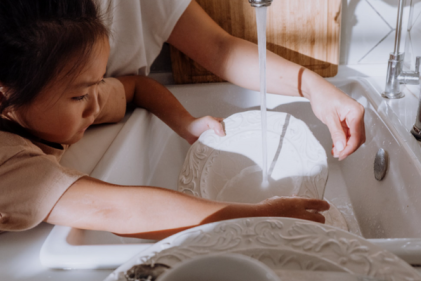One of the most important roles a parent has is to do what they can to help their little ones become the nicest, kindest version of themselves.
From letting them try things for themselves to expanding their worlds, these are 12 things that all parents should do to raise a truly kind kid...
Be a good role model
Children learn what they see.
If you want your child to be nice, polite and understanding towards others, the first thing you must do is to act that way yourself.
One key way to show kindness is to be understanding whenever your child messes up. For instance, if they get in trouble at school, don't go straight into screaming mode. Talk to them, ask them why they did what they did, explain to them why they shouldn't do that again. In other words, show kindness and try to understand.
Point out kindness in others
It's easy to take it for granted that kids know what being kind means. But that's not necessarily true.
With that in mind, make sure you highlight kindness when you see it. If your eldest shared their chocolate bar with their friend, say to your little one "wasn't that a nice thing to do?" Or if your husband offers to give you a lift to work, comment that "daddy's being so kind to mummy."
Promote effort
If you only ever praise your child for what they do well, they'll learn that giving things a go doesn't matter.
And if they don't value effort, then they'll only admire people who succeed. How then can they possibly empathise with people who are less fortunate?
Expand their horizons
We're all grateful that we can raise our children in the developed world, free of shanty towns and full of clean water.
However, it's a good idea to expand their world a bit. Turn on the TV or open your laptop and show them what life is like in poorer countries.
Understanding that they have it pretty good is essential if you're going to teach them empathy.
Explore feelings
By encouraging your child to reflect on and discuss their own emotions, it also helps them to recognise their peers' more subtle emotions — which gives them the opportunity to act accordingly.
Your child's willingness to put themselves into other people's shoes will be much-valued when they get older.
Talk about the power of words
Whoever said 'sticks and stones may break my bones but words will never hurt me' clearly never had anything nasty said to them.
Make sure your child knows that, and if you overhear them saying something hurtful to someone, sit them down and have a chat.
Ask them "how would you feel if someone said that to you?" and suggest they think about people's feelings before they say anything next time.
Teach them to appreciate differences
Kids can be mean, especially to other kids who are in any way different. With that in mind, have open conversations about the fact that we're all different.
Teach them that regardless of race, religion or disability, we're all human beings and we all deserve to be respected. If they don't learn to respect people from all walks of life, they may grow up close-minded...
Don't just focus on what the child wants
If you give in to your child's every whim, you'll teach them that their needs are greater than everyone else's, and that's a recipe for a seriously spoiled child.
So the next time they start sulking because they want to play the Playstation and their little brother got it first, don't pander to them.
Tell them that other people have wants and needs too, so it's important to learn to be patient.
Be consistent
Talking to your child about being gracious and considerate isn't going to mean anything if you make exceptions and only expect this thoughtful behaviour in certain situations.
If you make excuses or allow your child's frustration to become the priority, your words pale in comparison to your actions.
Show them the love
Doing all of the above is absolutely pointless if you don't show love for your child.
All the 'I love yous' in the world won't make a child feel loved if they're mistreated, ignored or neglected. Say it by all means, but don't forget to show it. We're talking hugs, kisses, chats and spending quality time together.


















